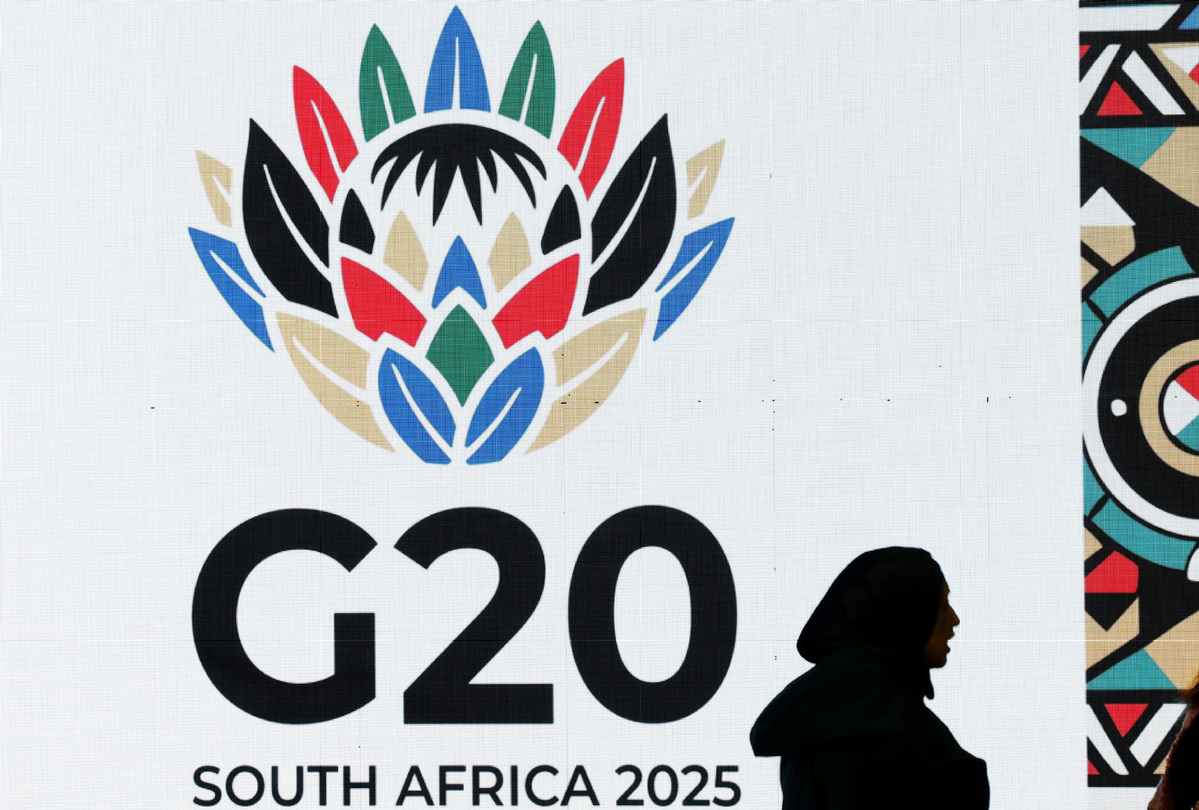
A guest is seen next to a display during a meeting of the G20 foreign ministers, which is hosted by South Africa, under the theme "Solidarity, Equality and Sustainability", at the NASREC conference centre in Johannesburg, South Africa, Feb 20, 2025. [Photo / Agencies]
Although the diplomatic tensions over a South African land restitution law that the Donald Trump administration has labeled land "confiscation" and unfair to whites seem to be the factor that prompted US Secretary of State Marco Rubio's boycotting of the G20 Foreign Ministers' Meeting in Johannesburg on Thursday, the absence of the top US diplomat had in effect saved an awkward moment that the deepening of rift between the US and its allies over Ukraine crisis is exposed to be unstoppable.
Yet the divide between the rest of the developed economies in the group and the emerging economies of the Global South was clearly shown in that the former expected to focus the conference on the resolution of the Ukraine crises, while the latter hoped to deal with what they say are much-needed reforms to international institutions, which they rightfully believe are the root causes of the burning issues.
South African President Cyril Ramaphosa said, "It is critical that the principles of the UN Charter, multilateralism and international law should remain at the center of all our endeavors. It should be the glue that keeps us together," calling for "cooperation" and "constructive engagement" to resolve conflicts.
South Africa, which assumed the G20's rotating presidency last year, is the first African country to host the foreign ministers' forum. Its ambition to take advantage of the opportunity to promote its agenda as a key member of the Global South and the major player on the world stage is understandable.
Yet, although the rest of the G20 members share similar concerns over the impacts of the "America-first" Trump administration, the divide among them over such key issues as the Ukraine crisis and climate change cannot be bridged simply by such calls of the South African leader.
As some observers point out, the program of pursuing a common developmental agenda as put forth by the Global South nations already suffers a perceived lack of urgency and is now under threat of being further overshadowed by ongoing geopolitical upheaval in the form of conflict, compounded by a dramatic realignment of US foreign policy under Trump.
So despite Rubio's absence from the meeting, it was US factors that cast a shadow over the gathering, preventing the group, which represents 85 percent of the global economic output, from reaching even a basic consensus for a coordinated response to neither such burning issues as the Ukraine crisis nor the long-term agenda on the reforms of world order.
So, as Chinese Foreign Minister Wang Yi said in his speech at the meeting, it is necessary to revisit the consensus reached at the Rio de Janeiro summit, work together as a force for world peace and stability, and build a safer world, he said, noting that China is ready to work with all parties toward that end.
As for the Ukraine crisis, it should be a consensus that, after the losses of tens of thousands of lives over the past three years, it cannot be easily settled through either side's victory on the battlefield, neither can sanctions work the way out. It should be and can only be resolved through dialogue and negotiation, which should be conducive to the formation of a lasting, balanced and workable new security architecture for Europe rather than usher the continent in a new round of bloc confrontation.
As Wang noted, the countries should work together as creators of universal security and ensure the security of one country should not be at the expense of the security of others, and the legitimate security concerns of all countries should be taken seriously.
There is no doubt that, as for the Ukraine crisis, the window for peace is opening, and China always stands for an early and peaceful resolution of the crisis and will continue to play a constructive role in its political settlement.
This year marks the 80th anniversary of the founding of the United Nations and the victory in the World Anti-Fascist War. History proves that the more complex the international situation and the more prominent global challenges become, the more important it is to uphold the authority of the UN and give full play to its role.
The historical lessons are still relevant to the volatile world situation today.